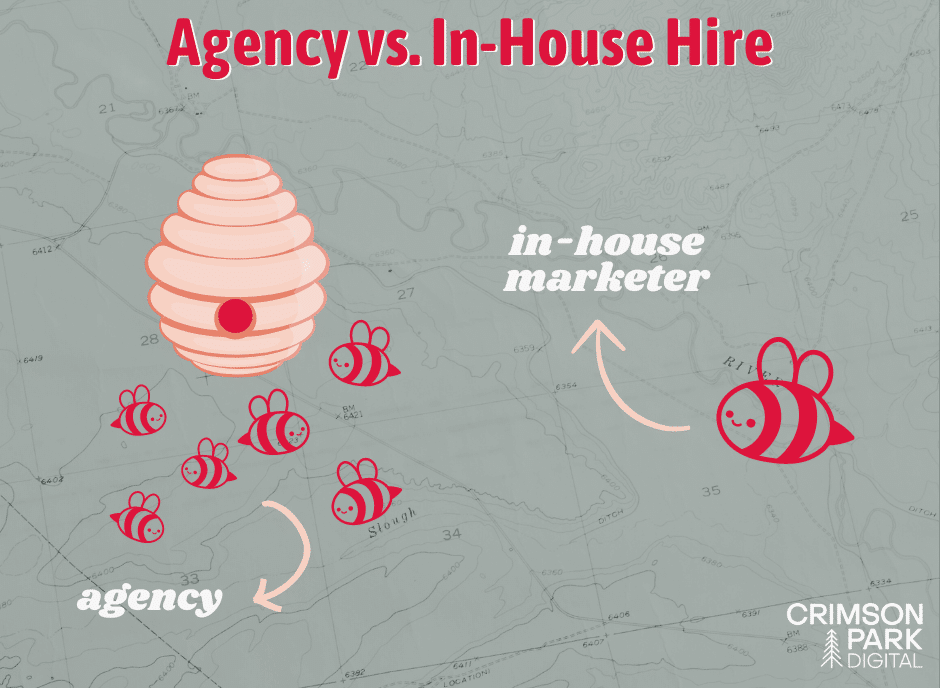Hiring for Marketing: Agency vs. Employee
When you’re hiring for marketing, choosing between an agency and a full-time employee can leave you conflicted. Making a poor staffing decision can be disastrous for your company’s finances, not to mention a waste of valuable time.
However, with the right strategy and understanding, choosing the perfect fit for your organization is entirely within your grasp.
The Core Differences: Marketing Agency vs. Employee
Choosing between a team of marketing professionals and one employee is complicated. There are many factors that go into what the “right decision” looks like, and it depends on your organization’s goals, performance timelines, overhead budget, and other requirements.
Let’s break down the core differences between an agency and an employee, when it comes to hiring for marketing.
The Structure of a Marketing Agency
Marketing agencies operate with a multi-faceted structure and offer a range of expertise. This hive of specialists works in unison, each putting to work their unique skills to develop and implement a comprehensive marketing strategy for their clients.
From graphic designers and copywriters, to SEO experts and social media managers, the diversity in talent in a marketing agency can’t be replicated easily in-house.
In an agency, each employee specializes in their area. This allows for an extremely high level of expertise in each channel of marketing, which is generally unattainable when you employ a single in-house marketer.
The Role of an In-house Marketing Employee
On the flip side sits your dedicated, in-house, full-time marketing employee.
An in-house marketer devotes their time and skills to your business and only your business. They live and breathe your brand, understanding its nuances, potential, and the specific market conditions it operates within.
While it’s true that an in-house employee is unlikely to match the range of skills found in a marketing agency, this doesn’t negate their value. The personal involvement they have with your brand and their intellectual property can still drive significant results.
Pros and Cons of Hiring a Marketing Agency
To help guide decision-making, let’s first dive into the pros and cons of a marketing agency:
The Advantages of Hiring a Marketing Agency
The top advantages of hiring a marketing agency are:
- Access to a full team of marketing professionals
- Support from a range of skill sets
- More likely to be able to scale quickly
- Shorter onboarding and training process
- Skip the costs of healthcare, bonuses, taxes and other HR costs
Choosing to partner with a boutique agency, in particular, earns your organization even more benefits. Boutique agencies give you access to executive-level marketers and impressive response times that you might not receive from a larger agency. You won’t be prioritized by budget and given a junior marketing team like the bigger players do.
The Disadvantages of Hiring a Marketing Agency
As radiant as the agency model can be, it’s not devoid of potential hurdles. Here are some disadvantages of an agency partnership:
- You can’t walk over to your in-house marketer’s desk to discuss an idea or tweak a strategy, potentially slowing down processes
- If your agency is in a different time zone, there is a risk of missed communication and timely opportunities
- Agencies have multiple clients, so their focus isn’t fully on you. (But the good ones treat you like you’re their only client.)
It’s essential to make this decision based on your team’s unique needs and circumstances. Understanding the differences between an agency and in-house hire, and weighing the pros and cons is the first step towards that.
Pros and Cons of Hiring an In-house Marketing Employee
Let’s consider the pros and cons of hiring a full-time in-house marketing employee:
The Advantages of Hiring an In-house Marketing Employee
The pros of hiring an in-house marketing employee include:
- Employee has an inside view of your organization
- An employee is at your fingertips for quick changes and strategy launches
- Solely creating campaigns for your business, not others
When you hire the right person, an in-house marketer can provide beneficial reliability and attention to your organization.
The Disadvantages of Hiring an In-house Marketing Employee
The cons of hiring an in-house marketing generalist include:
- Limitations in skill set
- Need for continuous training and professional development
- Expensive onboarding, benefits, and salary
- You’ll be starting all over if they quit
In comparison to an agency with multiple team members, losing an in-house marketer (if they quit, are fired, or take leave) makes a significant impact on business operations and marketing performance.
On the other hand, if a team member leaves an agency, they are quickly replaced by someone with a similar skill set, and you rarely even notice the change occurred.
Cost Comparison: Marketing Agency vs. Employee
Comparing the costs of hiring a marketing agency and an in-house employee is sometimes the linchpin of the decision, revealing important insights on which is more fitting.
The Cost of Hiring a Marketing Agency
Hiring a marketing agency doesn’t necessarily mean burning a hole through your bottom line. The charges are usually predictable, and can fit most business budgets.
A majority of marketing agencies operate on a retainer-based model, offering a variety of services for a monthly fee. This allows companies to plan and budget effectively.
The fees can vary significantly, however, depending on the size of the agency and the services availed. For example, smaller local agencies or freelancers may charge $1,000-$2,000 monthly, while larger agencies with a regional or national footprint may command fees in the tens of thousands monthly.
Another common pricing model is project-based pricing, which means the agency charges per project. The total cost of the project will depend on its complexity, deliverables required, and duration. The costs are often upfront, making it easier to budget around.
A third model, primarily used for advertising campaign management due to budget fluctuation, is a percentage of media spend. This allows your agency to scale its management efforts based on your budget so that the level of support is always aligned.
The Cost of Hiring an In-house Marketing Employee
While in-house employees offer several advantages, they also lead to increased costs that aren’t always obvious on the surface. The price of hiring an in-house marketing employee isn’t limited to just their salary.
A wide range of additional costs come into play when hiring an in-house employee, that are not components of an agency partnership.
Employee training is a significant cost in both time and money. Also, consider the costs associated with providing an employee with the resources they need to do their job effectively – this could include software licenses, subscriptions to various marketing tools, technology equipment, and more.
Finally, indirect costs such as paid time off, taxes and insurance, compliance, and loss of productivity during recruitment or if the employee leaves, add up to the bill.
Making the Right Marketing Hire Decision
Details such as budget, marketing needs, and the prevailing structure and industry of a business, are vital in determining whether to hire an agency or an in-house employee for marketing.
If you’re looking to develop a broad-reaching marketing strategy, an agency might be a smart choice as they have diverse specialists. Yet, for a company wanting a focused marketing strategy, or desiring a direct hands-on approach, a dedicated employee may be the best fit.
Last on your checklist should be your business’s size and industry. The size of your business could dictate the scale of the marketing required, which may be better suited to an agency.
Additionally, many agencies focus on specific industries and come equipped with that knowledge, which is highly valuable.
It goes without saying that success isn’t tethered to one over the other. Plenty of businesses have flourished by adopting both options in a hybrid model, harmonizing the strengths of each to optimize their marketing strategy.
Your Next Great Hire: Agency Or Employee?
Remember, marketing agencies can provide a wealth of expertise, diverse skills, and scalability. No matter your decision, ensure it complements your business objectives and financial capacities.
As you mull over your options, consider a hybrid model as a solution. Engage an agency to strategize and upskill the in-house team for implementation.
At Crimson Park Digital, we work directly with solopreneurs, lean in-house marketing teams, and broader organizational teams.
Tap us in to see how we can augment your current marketing efforts.
Frequently Asked Questions
Is it better to hire a marketing agency or employee?
Deciding between hiring a marketing agency or an employee hinges on factors like business needs, budget, and expertise preferences. A marketing agency offers diverse skills, industry knowledge, and a team of professionals at a potentially lower cost, providing flexibility and scalability. In contrast, an in-house employee fosters a deeper understanding of company culture, goals, and operations. The choice should align with specific business requirements and circumstances.
When should I use a marketing agency?
Use a marketing agency when you need diverse skills, industry expertise, and a flexible, scalable approach. It's beneficial for projects with varying demands, where external perspectives and a specialized team can provide cost-effective solutions.
What is the difference between an agency and marketing team?
An agency is an external service provider offering specialized marketing services, while a marketing team consists of in-house employees responsible for a company's internal marketing efforts. Agencies bring external expertise and flexibility, while in-house teams provide direct alignment with company culture and goals. The choice depends on specific business needs and preferences.



